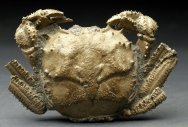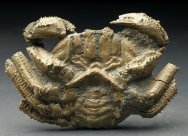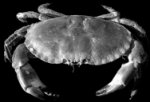Avitelmessus grapsoideus
Subphylum Crustacea, Class Malacostraca, Order Decapoda, Infraorder Brachyura, Superfamily Cancroidea, Family Atelecyclidae
Geological Time: Cretaceous (67 million years ago)
Size: Crab fossil is 10.8 cm (4 3/16”) in width by 7 cm (2 7/8”) in length
Fossil Site: Peedee Formation, North Carolina
Fossil Code: PFD47
Price: Sold
|
Specimens like this are likely never to be seen again, and this specimen would enhance any collection, public or private. This is the larger of two that I just acquired from a close to final liquidation of the collectors holdings. These two will be the last of these exquisite Avitelmessus. The other has not yet been posted. (The $4500.00 huge Avitelmessus, PFD47, still up on display on my Crustacean page 1 was recently purchased, and will be donated to a museum in Australia. In fact, museums around the globe are clamoring for one of these to add to their collections (though enough information has been gather from partial specimens to make this one of the better understood fossil families in history!). In life, like crabs of now, those spines and bumps served as anchor points for sponges, algae’s and the like to help in the camouflage of this unique animal. One can imagine it was probably not very appetizing to swallow with the longer spines as well (although, clearly bitten partial specimens were uncovered during the existence of the quarry). This crab was preserved in what we have found must have been a
catastrophic burial (localized underwater slide or hurricane event.)
All the fossils found are found in relatively very shallow lenses
in the Peedee of North Carolina, and a very small arial range. |


 dakotacancridae.
dakotacancridae.